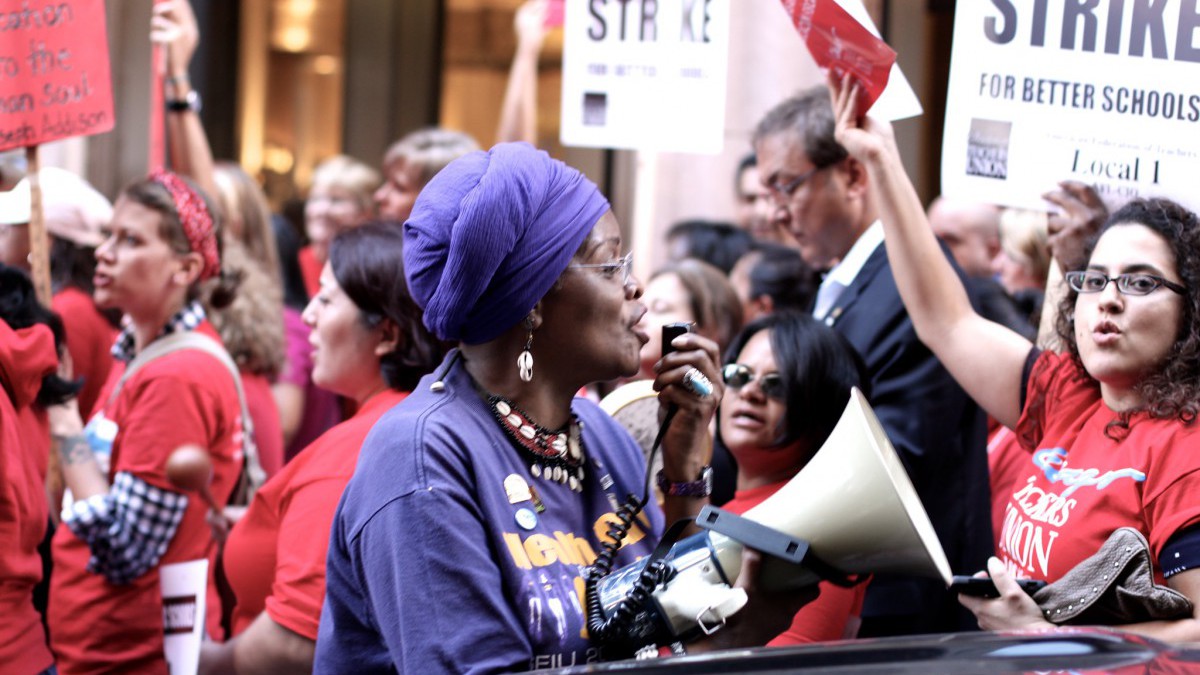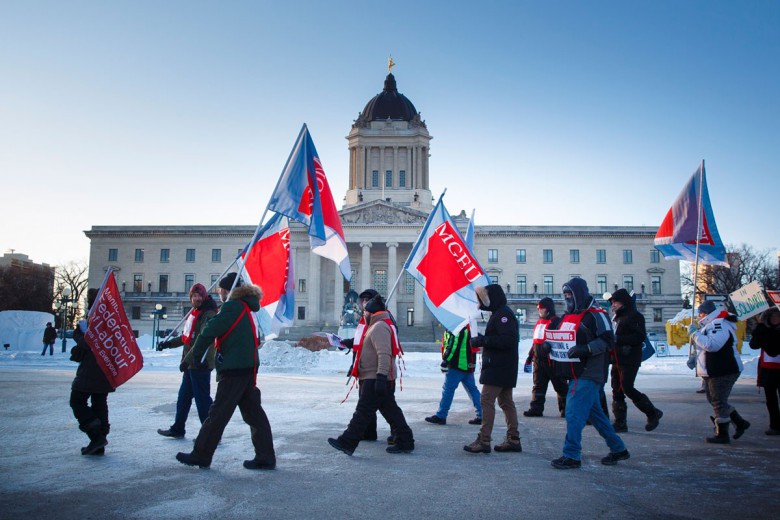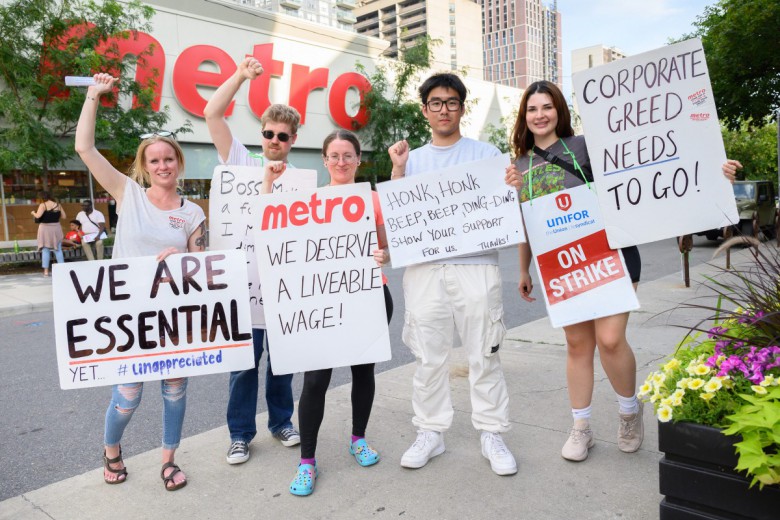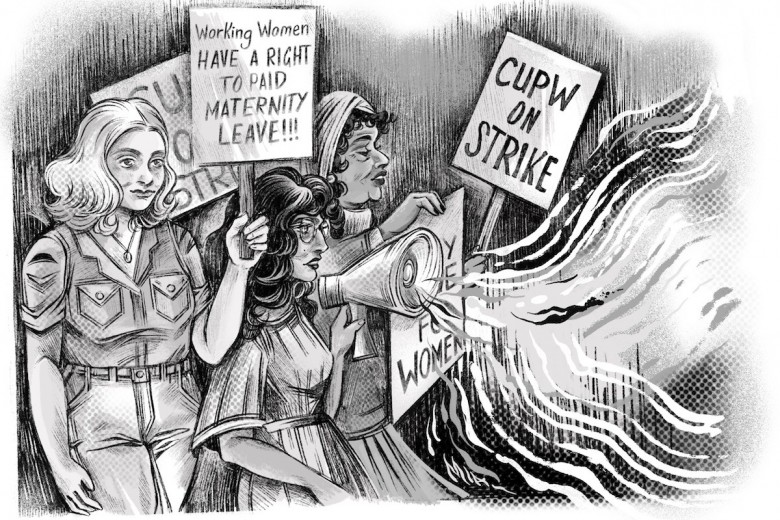In 2018, tens of thousands of teachers in the red states of West Virginia, Arizona, and Oklahoma began to strike. Fed up with conservative union leadership that preferred lobbying to organizing, and spurred on by a “militant minority” of socialists in their ranks, teachers went out on illegal strikes and won monumental gains – proving the age-old maxim, “there are no illegal strikes, just unsuccessful ones” (or, more simply, “they can’t fire us all”). As Ellen David Friedman wrote for Labor Notes, “The undercurrent which the red state revolt captured is a ripple of non-acceptance, of throwing off hopelessness and fear.”
The strikes – still workers’ most powerful weapon against capitalist exploitation – shifted the entire public discourse around unions and education. In late August, a new poll showed that Americans’ approval of labour unions hit a 16-year high, reaching 64 per cent. That was, at least in part, because teachers were “striking for the common good” – making demands that would benefit the community as a whole, like more resources for students and smaller class sizes. Their demands highlighted the fundamental injustice of capitalism: the fact that capitalist society will inevitably fail to provide even the most basic needs of the public. And when workers strike for demands that don’t simply serve their own self-interest, they challenge capitalism’s imperative that we must only ever look out for our own interests. These were strikes with revolutionary potential.
“The undercurrent which the red state revolt captured is a ripple of non-acceptance, of throwing off hopelessness and fear.”
Bosses know that bargaining for the common good is a powerful tool, when workers use it – which is why they try to disallow it. In Chicago, for example, teachers are primarily allowed to strike over issues of pay and health benefits. The city is not legally required to bargain over – nor are workers allowed to walk out over – other demands, like caps on classroom sizes, or more school nurses, social workers, and librarians. But some Chicago teachers have 40 kids in their classrooms. In October, Chicago teachers were being offered a 16 per cent pay raise. If teachers took the raise, the city would have had no reason to continue to bargain with them over non-wage issues, and they wouldn’t legally be allowed to strike to achieve those demands, either.
Instead, as I write, teachers are out on the picket line for the first day of their strike. A Chicago Sun Times poll showed that half of Chicagoans support a teachers’ strike, and would be most likely to hold Chicago Public Schools and city officials responsible. The backstory is that in 2010, the Caucus of Rank and File Educators (CORE) organized to win control of the Chicago Teachers Union (CTU) in a run-off election, and then ran a multi-year grassroots campaign to defend public education. CORE’s community outreach and member engagement is responsible for the CTU’s strong public support today.
Though the contexts of teachers’ struggles in the U.S. and Canada differ significantly, I remain interested in what we can learn from Chicago and the red state revolt. As a wave of conservative provincial governments swept across Canada in recent years, it’s ravaged public-sector budgets. Education workers in Ontario, Alberta, Manitoba, Saskatchewan, New Brunswick, and Quebec have been fighting against attacks on their wages, jobs, and working conditions. In September, the right-wing Saskatchewan government offered teachers salary increases and a $1,500 bonus – while in the same breath refusing to negotiate class size and composition. But the Saskatchewan Teachers’ Federation (STF) turned down the money and stood firm on their demand for reduced class sizes in schools that are “bulging at the seams.” Put simply, they’re refusing to sell out the children they’re responsible for teaching.
When teachers are bargaining close to an election, open negotiations become an opportunity to expose the avarice of an austerity government, and encourage the public to eventually unseat them.
The STF also made the unusual – but powerful – choice to make details of contract talks public, hoping to sway public support to their side. When teachers are bargaining close to an election – as is the case here, with the provincial election barely a year away – open negotiations become an opportunity to expose the avarice of an austerity government, and encourage the public to eventually unseat them.
Teachers’ working conditions are students’ learning conditions. Teachers bargaining for the common good contains the seed of radical change – and I mean “radical” in the same way that Angela Davis uses it, meaning “grasping at the root.” The way we teach children lies at the root of all other problems and solutions, because it dictates the enduring tools and beliefs that those kids will later use to shape the world. Change that, and we stand a chance of fundamentally altering our relationships to one another, and to the Earth.
This is a thread that runs throughout this year’s labour issue: the truth that we are tied together in the fight against the ruling class, the fight for a more just and egalitarian world. This thread appears most prominently in Barret Weber’s article on Alberta public-sector unions banding together to fight back against Jason Kenney’s cuts to health care and education. But it’s also apparent in Samantha Ponting’s feature about women maquila workers in Honduras organizing against discriminatory firings; in Erin Innes’ feature about prison labour and prison farms; and in Kate Jacobson’s feature about airport workers joining forces in Canada’s biggest workplace.
As they say, a rising tide lifts all workers.







